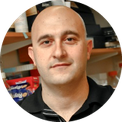
Prof. Jacob (Yaqub) Hanna Weizmann Institute of Science, Israel
1 TalkBiography
Born in Rama, an Arab Palestinian village in the Galilee region of Israel, Prof. Jacob (Yaqub) Hanna earned his BSc in medical science (2001), PhD in immunology (2007), and MD in clinical medicine summa cum laude (2007) from the Hebrew University of Jerusalem. He conducted postdoctoral research at the Whitehead... read moreInstitute for Biomedical Research at MIT. He joined the department of Molecular Genetics at the Weizmann Institute in 2011.
Prof. Hanna is pioneering techniques in induced naïve pluripotency from adult cell and synthetic whole embryo models made solely from stem cells ex utero. Prof. Hanna was the lead researcher in a study that showed how further-modified iPS cells could be used to treat sickle-cell anemia in mice, the first proof of concept of the therapeutic application of iPS cells. He was the first to expand prolonged periods of advanced and normal mammalian embryo development from pre-gastrulation until late organogenesis in an “artificial uterus” environment outside the maternal womb. The latter platform enabled him to demonstrate the ability to be the first to generate advanced stage whole synthetic embryos made entirely from naïve pluripotent stem cells in the petri dish, that can complete gastrulation and demonstrate organ formation within adequate extra-embryonic compartments. In addition to demonstrating the power of cell reprogramming and ex utero synthetic advanced embryogenesis, his work offers the promise of powerful new research models for degenerative diseases, infertility, and modelling human early development.
During his postdoctoral work, Prof. Hanna received a prestigious Novartis Fellowship from the Helen Hay Whitney Foundation. In 2010, he was awarded the Sir Charles Clore Prize for Outstanding Appointment in the Weizmann Institute. He received an EMBO young investigator award (2012), a Rappaport Prize in biomedical research (2013), a Krill Prize by the Wolf Foundation (2013), and the Helen and Martin Kimmel Award for Innovative Investigation (2014). In 2014, he was featured among “40 under 40” innovative scientists by the prestigious journal Cell and was elected as a member of EMBO in 2018. In 2021, he ranked at the top of the list of 50 leading world thinkers by Prospect magazine.
